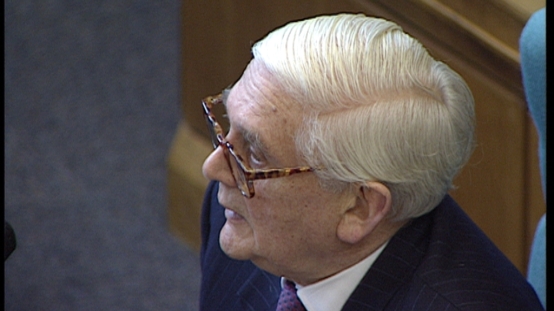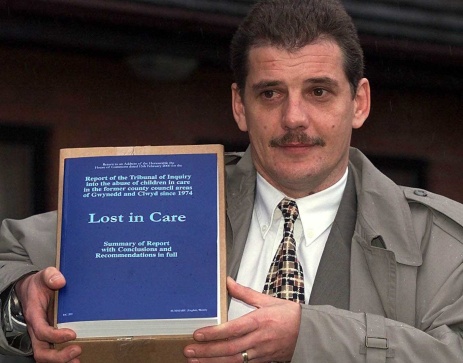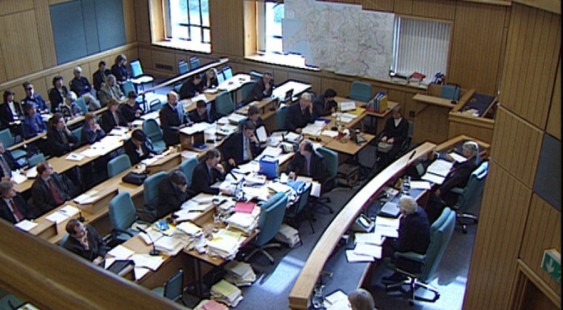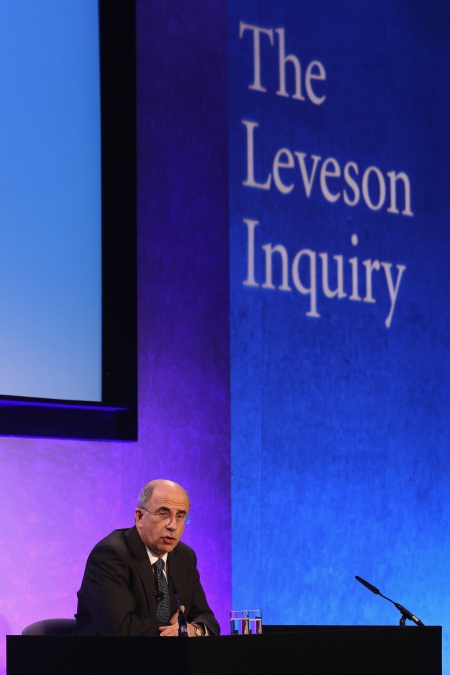THE MACUR REVIEW — Part One: BLOODY WHITEWASH
THE REPORT of the Macur Review — an examination of the work of the 1996-99 North Wales Child Abuse Tribunal — is a whitewash.
Lady Justice Macur’s report was finally published on March 17 this year — nearly three and a half years after it was commissioned.
She concludes:
“I have found no reason to undermine the conclusions of the Tribunal in respect of the nature and scale of the abuse.”
She brushes aside evidence submitted by Rebecca — one of the Tribunal’s major critics.
She also rules out the existence of a national paedophile ring:
“Neither is there evidence of the involvement of nationally prominent individuals in the abuse of children in care in North Wales, between 1974 and 1996.”
“Consequently, I do not recommend the establishment of a further public or private inquiry.”
But Lady Justice Macur is also highly critical of the Tribunal.
Her team has done enough digging to find shocking shortcomings in its work.
She could have condemned it as unfit for purpose.
There’s a precedent for this.

LADY JUSTICE MACUR
NINE MONTHS after she agreed to chair the Review, Julia Macur was promoted to the Court of Appeal — one of 42 senior judges who gain a knighthood (or its equivalent) and a seat on the Privy Council.
NINE MONTHS after she agreed to chair the Review, Julia Macur was promoted to the Court of Appeal — one of 42 senior judges who gain a knighthood (or its equivalent) and a seat on the Privy Council.
The Widgery Report was widely branded a whitewash.
A second, more thorough Tribunal — the £200 million Saville Inquiry — finally ruled in 2010 that paratroopers “lost control” and killed people “none of whom was posing a threat …”
The Macur Review didn’t take this route, choosing to whitewash the North Wales Child Abuse Tribunal.
But it’s still a bloody whitewash.
Lady Justice Macur delivers devastating blows to the reputation of Tribunal chairman, Sir Ronald Waterhouse.
One of her judgments concerns Waterhouse’s handling of a witness who gave ‘tainted evidence’ before him.
The Welsh Office became aware the witness wasn’t telling the truth — and was so concerned it asked a barrister to look at what happened.
The barrister recommended an inquiry.
But when the Welsh Office sent the barrister’s opinion to Sir Ronald, he ignored it.
He didn’t even mention the allegation in his report.
Lady Justice Macur finds his response “surprising”.
She could easily have said it was “shocking” and “unforgiveable”.
She condemns another of Waterhouse’s decisions — a refusal to establish a register of freemasons — for showing “a lack of due diligence in a matter of clear public interest”.
Lady Justice Macur is saying, in effect, that Waterhouse was contemptuous of public concern about the issue.

SIR RONALD WATERHOUSE
THE RETIRED High Court judge, who died in 2011, showed a “a lack of due diligence in a matter of clear public interest” when he refused to establish a register of freemasons.
THE RETIRED High Court judge, who died in 2011, showed a “a lack of due diligence in a matter of clear public interest” when he refused to establish a register of freemasons.
But one of the Review’s most important revelations — that North Wales Police withheld dramatic new information from the Tribunal — cannot be reported for legal reasons.
Lady Justice Macur ends her foreword with the words:
“I hope that this Report may bring a conclusion to the question mark raised against the Tribunal …”
It doesn’t — it succeeds only in adding new ones …
♦♦♦
THE MACUR Review was set up in dramatic circumstances.
On 2 November 2012 the BBC Newsnight programme carried an interview with Stephen Messham, a child abuse victim from North Wales.
Messham claimed that an unnamed senior Tory politician — later revealed to be Lord McAlpine — had abused him while he was in care at the Bryn Estyn children’s home near Wrexham.
The broadcast, coming a month after the shocking ITV programme outing Sir Jimmy Savile as a sexual predator at the heart of the British establishment, was electrifying.
Three days later, on Bonfire Night, David Cameron announced two new inquiries.
One was a new police investigation into historic child abuse allegations — Operation Pallial.
The second was a judge-led investigation — the Macur Review — into the work of the North Wales Child Abuse Tribunal which sat between 1996 and 1999.
Rebecca has been a long-standing critic of the inquiry — Britain’s only child abuse Tribunal — with a long series of articles called The Case Of The Flawed Tribunal published in 2010.
The most important of these — Silent Witness — concerned a former care home executive who was not called by the Tribunal.
He claimed to have alerted police to allegations of abuse more than a decade before a major North Wales Police inquiry began.

STEPHEN MESSHAM
THE CHILD abuse victim was photographed with the Waterhouse Report when it was published in 2000. Twelve years later he triggered two major inquiries when he claimed Lord McAlpine had abused him at the Bryn Estyn children’s home. By the time he realised it was a case of mistaken identity, it was too late to stop the investigations …
THE CHILD abuse victim was photographed with the Waterhouse Report when it was published in 2000. Twelve years later he triggered two major inquiries when he claimed Lord McAlpine had abused him at the Bryn Estyn children’s home. By the time he realised it was a case of mistaken identity, it was too late to stop the investigations …
Gillan never replied.
The day after the Prime Minister announced the new inquiries, Home Secretary Theresa May made a statement to the House of Commons about the police investigation.
In the debate that followed, Paul Flynn MP (Newport West) raised theRebecca articles:
“I ask the right hon. Lady to look not only at the fresh evidence but at the evidence that was available at the time and that was almost certainly suppressed by powerful people.”
“Will she look at the evidence produced by Paddy French and theRebecca website …”
Home Secretary May replied:
“The police investigations will look at the evidence that was available at the time in these historical abuse allegations, and at whether the evidence was properly investigated and whether avenues of inquiry were not pursued that should have been followed up and that could have led to prosecutions”
“I can therefore say to the hon. Gentleman that the police will, indeed, be looking at that historical evidence. That is part of the job they will be doing.”
That debate took place on Tuesday.
But by Friday Stephen Messham had retracted his allegation:
“After seeing a picture of the individual [McAlpine] in the past hour,” he said, “this [is] not the person I identified by a photograph presented to me by the police in the early 1990s, who told me the man in the photograph was Lord McAlpine.”
By then it was too late to stop Operation Pallial.
And the Review of the North Wales Child Abuse Tribunal was also under way …
♦♦♦
FOR MORE than two years Rebecca co-operated with the Macur Review.After a first statement was submitted in January 2013, Lady Justice Macur asked for a meeting with editor Paddy French.
This took place at the Royal Courts of Justice in London in March 2013.
By that time a second statement had been delivered.
A third statement was submitted in July 2013.
But things began to go wrong in the autumn of 2013.
A fourth statement could not be completed because access to the transcripts of the public hearings of the Tribunal in 1997-98 was denied.
These had been made available to Rebecca when it was preparing the 2010 series The Case Of The Flawed Tribunal.
Many of these articles could not have been written without access to the transcripts.
In September 2013 Rebecca wrote to then Welsh Secretary David Jones asking for a full set.
His spokesman said:
“Access to material is solely the responsibility of the independent Macur Review.”

CLASSIFIED DOCUMENTS
WHEN THE Waterhouse Tribunal was sitting in 1996 and 1997, its hearings were open to the public and daily transcripts were available. In recent years, however, both the Wales Office and the Macur Review have deniedRebecca access to them …
WHEN THE Waterhouse Tribunal was sitting in 1996 and 1997, its hearings were open to the public and daily transcripts were available. In recent years, however, both the Wales Office and the Macur Review have deniedRebecca access to them …
A spokeswoman said:
“ … it would be inappropriate to provide the transcripts because she wants to hear your perspectives based on your recollections so as to preserve the integrity of your submissions.”
In October 2013 Paddy French wrote to Lady Justice Macur to express “a sense of concern” at her decision.
He said that he given her “everything that relates to my personal recollection” and concluded:
“Without the transcripts I don’t feel able to make a further statement.”
Lady Justice Macur was unmoved, access to the transcripts was denied — and the statement was never completed.
By this time, Rebecca was also becoming concerned at the length of time the review was taking.
An official said there were “no imminent plans to submit our report …”
In February 2015, more than two years after the Review started work, Paddy French wrote to Lady Justice Macur:
“I am considering withdrawing from the Review.”
“The passage of time has seriously eroded my confidence in the process.”
“It’s clear to me that the Review will not be complete by the election and, by the time the new administration is in place and able to take a decision, we will be into the autumn.”
An official replied:
“Lady Justice Macur has seen your email … and noted its contents.”
Rebecca — by now suspecting the Review would be a whitewash — withdrew.
Paddy French asked the judge to remove his statements from her report — and to “include my reasons for doing so in the Review’s report …”
The Review replied:
“The judge has asked me to let you know that she has found no reason to refer to your submissions specifically in her report and therefore it will not be necessary for her to indicate why she has removed them.”
In March 2015, Rebecca also wrote to Home Secretary Theresa May to express “concerns about the delay in the completion of the Macur Review …”
The letter pointed out that the review — which the judge had initially promised would “be thorough and expeditious” — had already taken 26 months.
This compared to the 39 months of the original Tribunal, an “enormous undertaking” costing £14 million.
Lord Leveson’s three volume report into press ethics was published in just 17 months.

LEVESON FAST, MACUR SLOW
LORD LEVESON’S inquiry into the culture, practices and ethics of the press was similar to the Macur Review. Both had parallel police investigations to deal with but Lord Justice Leveson was swift compared to Lady Justice Macur.
LORD LEVESON’S inquiry into the culture, practices and ethics of the press was similar to the Macur Review. Both had parallel police investigations to deal with but Lord Justice Leveson was swift compared to Lady Justice Macur.
“I am also concerned that the Review may have already made up its mind, concluding that the Waterhouse Tribunal was broadly sound.”
When the Macur Review was finally published, in March this year, it had taken 38 months — just one month less than the Tribunal it was examining.
And it proved to be the whitewash that was feared.
♦♦♦
THE MACUR Review is a classic example of the “long grass” theory of handling a political crisis.As former Metropolitan Police Commissioner Sir Paul Stephenson put it:
“ … it’s that classic leadership trick, which a number of us pull when we are in deep difficulty, to say — this is disgraceful and we must have an inquiry.”
The idea is to launch an inquiry which takes so long to report that the reason for its existence is long-forgotten.
This is precisely what has happened to the Macur Review.
The Welsh media only carried its findings.
(BBC Wales said the inquiry took two years when it was closer to four.)
No London-based newspaper reported the conclusions — and even Private Eye, which has a long-standing historical interest in the story, was silent.
This means the Rebecca analysis is likely to form the only serious examination of the Review.
The second article — The £3m Whitewash to be published tomorrow — examines how the Macur Review handled our key complaint against the Tribunal.
The Tribunal had cleared North Wales Police of failing to investigate abuse allegations in the 1970s and 1980s:
“there was no significant omission by the North Wales Police in investigating the complaints of abuse to children in care.”

NORTH WALES POLICE
ALLEGATIONS THAT the force covered up allegations of child abuse in the 1970s and 1980s were one of the reasons the Waterhouse Tribunal was set up. The Tribunal cleared the police of any blame but the rumours continued …
ALLEGATIONS THAT the force covered up allegations of child abuse in the 1970s and 1980s were one of the reasons the Waterhouse Tribunal was set up. The Tribunal cleared the police of any blame but the rumours continued …
The third article looks at the Review’s damning indictment of the way Tribunal handled freemasonry.
The fourth piece examines some of the new material thrown up in the course of the review.
This includes an extraordinary claim by former Welsh Secretary of State, David Jones, that a member of the Tribunal staff rang him before the Waterhouse report was published.
The official told him that former Chester Tory MP Sir Peter Morrison, Margaret Thatcher’s private parliamentary secretary, would be named in its report.
Lady Justice Macur notes that Morrison’s name is not mentioned in the Waterhouse — and decides the phone call was probably a “hoax”.
The final article — dealing with sensational new material concerning North Wales Police — cannot be released at this time for legal reasons.
It’s likely to be published towards the end of this year or the beginning of 2017.
♦♦♦
NOTES1
The full report of the Macur Review can be found here.
2
There’s more detail on the main Rebecca criticism of the Waterhouse Tribunal in the article Silent Witness. A TV programme, A Touch Of Frost, was withdrawn after ITV refused to allow its copyright material to be used. However, ITV Wales later broadcast an edition of its Wales This Weekstrand which carries most of this footage. To see click it, on Still Lost In Care.
3
The story of how Rebecca came to withdraw from the Macur Review is told in the piece The Macur Review — A Loss Of Confidence.
♦♦♦
Published: 9 May 2016© Rebecca Television♦♦♦
DONATIONS IF YOU would like to support the work of Rebecca, you can do so by clicking on the Donate button.
COMING UP
PART 2: THE £3m WHITEWASH
WHY DID the Waterhouse Tribunal not hear from a key witness? He claimed to have blown the whistle on child abuse more than a decade before North Wales Police began investigating. The Macur Review brushes aside damning evidence from journalists and declares the Tribunal was justified in not calling him …
♦♦♦
CORRECTIONS Please let us know if there are any mistakes in this article — they’ll be corrected as soon as possible.RIGHT OF REPLY If you have been mentioned in this article and disagree with it, please let us have your comments. Provided your response is not defamatory we’ll add it to the article.


I said right from day 1 that it would be a whitewash.
ReplyDelete